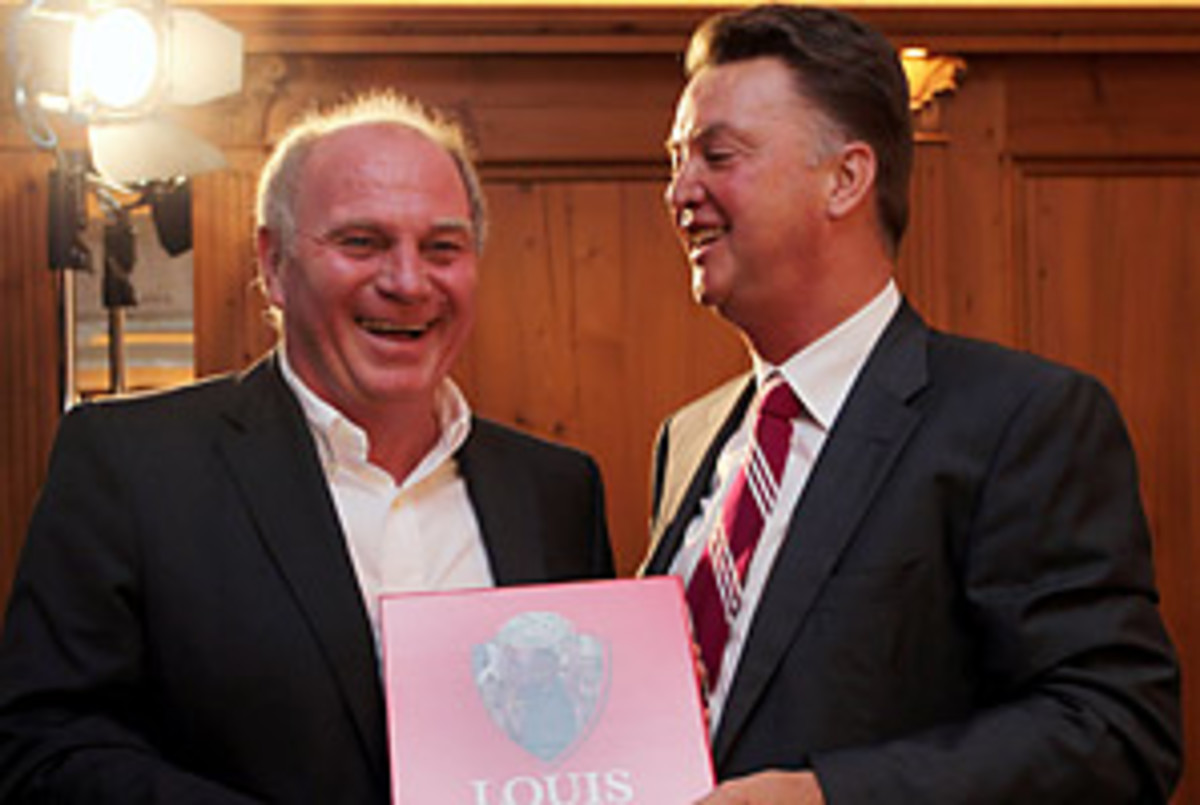
Bayern's VIPs strike uneasy truce
"We have turned over €350 million [$490 million] last season and have made a profit," the 58-year-old Hoeness told SI.com. "If [the new UEFA rules of] Financial Fairplay will really come into force, we will have a good chance [to compete with Europe's biggest clubs] in the future."
A labored but ultimately comfortable 4-2 win over SC Freiburg later that day seemed to further alleviate the pressure on coach Louis van Gaal's injury-ravaged team. The fact that formerly marginalized players Anatoliy Tymoschuk, Mario Gomez and Martin Demichelis each scored a goal gave the victory even a bit of a romantic note.
But 48 hours later, all heck broke lose. Hoeness was sitting in a TV studio, and he wasn't happy.
"I see Demichelis score the first goal -- he was told he could go," Hoeness said. "The second one was scored by Gomez, who was almost at Liverpool [in the summer]. The third one is scored by Tymoschuk. I read that he only played because they're no one else around. In my view, these players were treated badly. They should have been backed much earlier."
This, the anchorman realized, amounted to a full-blown attack on van Gaal. The coach had never made secret of the fact that both the Ukrainian midfielder Tymoschuk and the Germany striker Gomez had been bought without his consultation, and he had benched veteran defender Demichelis for the 21-year-old Holger Badstuber.
Asked whether he had told van Gaal his misgivings, Hoeness shook his head. "He doesn't accept other people's opinions, there is no use talking to him," Hoeness said. To cap it all off, the former Germany winger warned that "football cannot be a one-man show anymore these days."
The fallout was dramatic. Bayern issued a news release on Monday morning, claiming that CEO Karl-Heinz Rummenigge was acting as a mediator between the two heavyweights. The papers wondered why Hoeness was criticizing the most successful manager of recent times in such harsh terms.
There was, to be sure, an element of "I told you so" in what Hoeness said. Van Gaal, a man with a certain arrogant streak, has in the past belittled his superior's football expertise. So this was payback time. And Hoeness' calculated, calmly delivered outburst was a belated reply, too. A month earlier, van Gaal had released his autobiography. One passage dealt with interference by the club's illustrious troika of former players.
"Franz Beckenbauer's opinion is seen as gospel," the Dutchman wrote. "And on the board, you have ex-stars like Rummenigge and Hoeness who have an open ear for today's stars. There's something nice about that, but I think it's the wrong way to do things. It jars with my philosophy."
Bayern did not respond at the time, but the impulsive president was not going to let that one go. Listening back to the interview tape from Friday's lunch, one realizes that he saw things very differently.
"[Players who don't play] need another ear sometimes, a different ear," he said. "Van Gaal doesn't like it, but we will never accept that a player can't come to us if he has problem."
This, however, is not simply a disagreement about Hoeness' influence and power. Bayern prides itself on its family attitude to solve problems. For example, it was Hoeness who, through a series of get-togethers in the spring, persuaded French winger Franck Ribéry to renew his contract. Bayern's patriarch is annoyed and hurt that the autocratic van Gaal doesn't see the value of this kind of emotional input.
"We thought we might change him, but he didn't change one bit," he said with a shrug Friday.
The club was surprised by the president's anger -- and not best pleased. Rummenigge was especially uncomfortable with the timing of Hoeness' intervention. Sporting director Christian Nerlinger, the first official to support the coach when he was about to get fired a year ago, refused to address the issue. "Entertainment is not my domain," he told reporters Tuesday.
Even the players seemed taken aback. "The relationship between the team and the coach is very good," Thomas Müller insisted.
"I'm disappointed and astonished," an emotional van Gaal said at the prematch news conference in Cluj. On Tuesday evening, a brittle peace broke out. "Uli Hoeness and Louis van Gaal find common ground," the official statement on the Bayern Web site read. "At the end of a meeting with [board members] Karl-Heinz Rummenigge, Christian Nerlinger and Karl Hopfner, they shook hands and agreed to work together responsibly for the good of Bayern Munich."
The key issues, however, have not been resolved. Van Gaal and Hoeness will have to learn to live with each other's idiosyncrasies, since neither one is in any position to get rid of the other. But the uneasy truce will only last as long as the results are in line. All those who were afraid that Munich was slowly turning into a more normal, manager-driven club after last season's renaissance can rest assured: Bayern's complex power structure and cluster of alpha males will continue to produce plenty of strife and arguments, along with the usual financial and sporting success.




